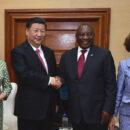The Beginning of the End for ODA?
The last ten years has been a remarkable experiment in using official development assistance (ODA) as a motor for development in Africa (and other developing countries too). It has been a bonanza for the aid industry and especially the favoured elements such as HIV/AIDS, which have often found themselves in the remarkable situation in which resource availability is not a binding constraint. 
Jonathan Glennie’s book, coming in the wake of a growing number of critiques of the international aid, shows just how flimsy are the intellectual foundations of the aid-for-development experiment. Even before the financial crash, the promises of huge increases in ODA to reduce world poverty were becoming increasingly doubtful.
One of many ironies of this situation is that most of the proponents of aid””including its most ardent advocates such as Jeff Sachs””have all along promoted ODA as part of a wider package that includes debt relief, trade reform and improved economic governance in developing countries so as to generate improved investment and growth. Aid has been seen as just one of the instruments for economic growth, and arguably the least important one. But, aid seems to displace the other parts of the development debate. Of the other pillars, only debt relief has seen any significant progress in the last ten years. Trade reform and economic governance are much harder, and far less progress has been made.
Aid donors and recipients alike have good reason for preferring to focus on aid rather than trade or governance. Industrialized countries don’t want to liberalize trade in agricultural products, while making new commitments to aid targets provides popular headlines. African governments like aid because most of it comes to them, and while they are strongly in favour of trade reform they are understandably resistant to governance reform. Therefore we see that NEPAD began with a focus on governance, trade, and debt, with aid at the margins, but was reduced very rapidly to an aid disbursement mechanism.
Even before the financial crisis hit last year, the limits of the ODA-driven response to global development needs were becoming apparent. The system is geared far too much to vertical systems which can generate short-term monitorable results. It is inefficient, with dozens of parallel aid missions in recipient countries all doing much the same thing. It is open to manipulation and abuse to support other policy objectives of donors and lenders, which as Glennie explains, undermines the stated objective.
All these shortcomings are politically tolerable in donor countries. What will make the existing system unmanageable is that cannot generate or disburse the scale of funding needed to respond to mitigate the impacts of climate change, let alone finance the transition to a low-carbon energy system. However, for so long as nobody has a practicable idea for what can replace the current system, ODA seems set to continue. At the moment, that serves the purpose of pretending to get to grips with these momentous challenges.






[…] Alex De Waal writes: The last ten years has been a remarkable experiment in using official development assistance (ODA) as a motor for development in Africa (and other developing countries too). It has been a bonanza for the aid industry and especially the favoured elements such as HIV/AIDS, which have often found themselves in the remarkable situation in which resource availability is not a binding constraint. […]
I see two things wrong with this argument.
First, it has not been a bonanza for aid. We have just about recovered aid volumes to the level they were before they collapsed at the end of the cold war. We are still talking about 20 cents per person in poverty per week in Africa. It is hardly a lot of money.
Second, I understand the argument that aid may have been a displacement activity for rich countries unable or unwilling to make progress on issues such as trade, reducing conflict, a fair deal on climate change, or extending migration opportunities. I agree that these issues are important – and that they are potentially more important than aid. But I am much less clear that there really is a trade-off between aid and making progress on these issues. How do we know?
Alex is making a bold claim that aid has delayed progress on these issues. Given the enormous good that aid does, the people who call for governments to pay less attention to aid had better be sure that this really will unblock progress on the other policy issues that will compensate for the loss of aid that will result. I am not so sure that they are right.
Let me make three points in response to your comment. But let me preface them by saying that this is a highly telegraphic version of a longer and as yet-incompletely elaborated argument about a possible turning point in global aid. I developed the beginnings of the case in a paper on assistance for children affected by HIV/AIDS, published in the IDS Bulletin last November, as part of the Joint Learning Initiative on Children and HIV/AIDS, and there is more to follow.
First, (and this may sound like hair-splitting—but I assure you it’s not), my point was not an aid bonanza but an aid industry bonanza. The funds available for those transacting aid have never been higher, especially in some cutting-edge areas like HIV/AIDS. The amounts of aid are, I agree, insufficient in comparison with the task. But what we see is that the processing capacity of the existing mechanisms is reaching its limit, and in some countries the absorptive capacity of aid is also a constraint. Mechanisms with low overheads (such as direct budget support) tend to have high political risks for donor countries.
Second, the relationship between the political pressure for aid and the pressure for better governance and fairer trade is an empirical one. It can work in either direction. I worked on the early days of NEPAD and it was interesting to see how the pressure for more assistance and debt relief (especially from the UK government) helped put trade on the agenda. The likes of Oxfam and the One Campaign have tried to keep it there. But I also watched as NEPAD was fast emasculated, shifting from an initiative in which aid played a minor role, to becoming little more than an old-fashioned funding mechanism. Jonathan Glennie argues in his book The Trouble with Aid (the occasion for my comment) that the conditionalities that accompany aid do more damage than the aid does good.
And, living in the U.S. under the last four years of the Bush Administration, it’s hard to escape the conclusion that increased aid to Africa (PEPFAR, MCA) was an alibi for not addressing the tough issues.
Third, my posting was entitled ‘The beginning of the end for ODA?’ not in the sense that aid is discredited and will shrivel, but in the sense of ‘ODA as we know it.’ Glennie argues that ‘less could mean more.’ There’s a tendency for the debate to be posed as ‘for’ or ‘against aid. I think that’s an error. In my IDS Bulletin piece I reframe the question, as ‘what is aid good for?’ There are some things it is demonstrably good for—health systems for example. But there are other things for which the existing ODA system has shown itself to have a record somewhere between mixed and disastrous—stimulating economic growth for example. There’s no shortage of debate on this latter topic. But as we contemplate the monumental sums required to finance the energy transition and to mitigate the impacts of climate change, I think we also need to address another question: how do we finance and deliver global public goods on a scale never before contemplated? I would be very surprised if existing ODA quantities and mechanisms are commensurate with the task. Something else will be needed—perhaps spelling the end of ODA as we know it.
First, (and this may sound like hair-splitting—but I assure you it’s not), my point was not an aid bonanza but an aid industry bonanza. The funds available for those transacting aid have never been higher, especially in some cutting-edge areas like HIV/AIDS. The amounts of aid are, I agree, insufficient in comparison with the task. But what we see is that the processing capacity of the existing mechanisms is reaching its limit, and in some countries the absorptive capacity of aid is also a constraint. Mechanisms with low overheads (such as direct budget support) tend to have high political risks for donor countries.